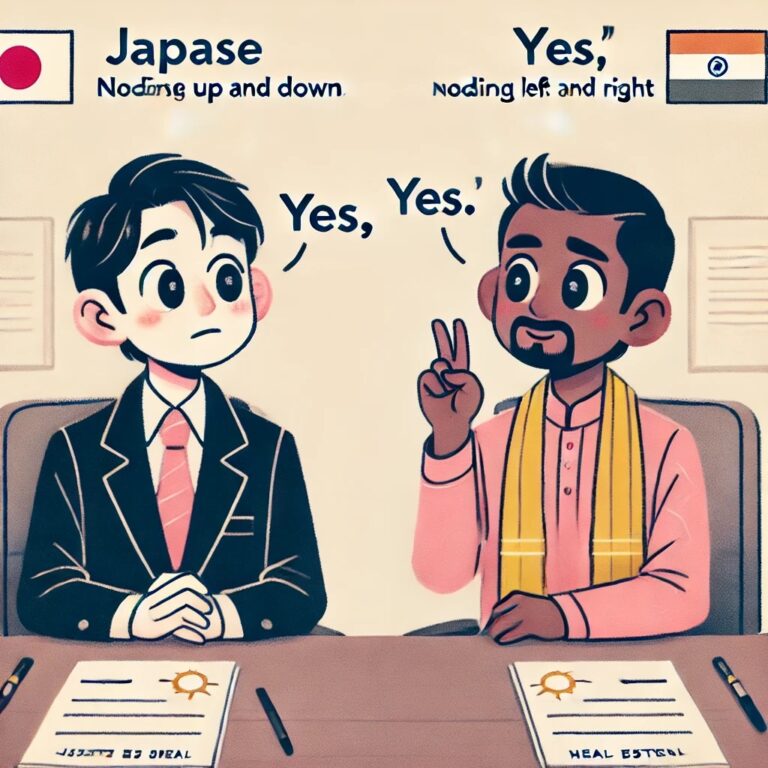若き学生時代に急遽海外放浪の旅に踏み出し、その経験から外国人賃貸業界に深い興味を抱くようになったのが、イチイ社長・荻野氏です。このコラムでは、そんな荻野の体験をコラム形式でお届けします。
※本コラムは『異文化共生住宅』をテーマにイチイ社長 荻野が2005年1月から2006年3月まで週刊住宅に寄稿したものです。
「No」といえない日本人 インド人は日本人とは逆の首の振り方だった
「インドでは“イエス”と“ノー”の首の振り方が日本とは逆」。こんな話を聞いたことがある人は多いと思う(ブルガリアもそうらしい)。だが、実際に目の前で“イエス”といいながら、ヤジロベエのように首を左右に振るインド人を見たことのある人は、そう多くはないだろう。
不動産会社で外国人の居住を担当する鈴木も、この話は旅行好きの友達から聞いて知ってはいたが、実際にその場に出くわしたこと事は最近までなかった。ところが、つい先日契約という大切な場面でその“逆首振り”に出くわしてしまった。アパートの契約内容を説明しながら、鈴木は何回も「わかった?」と繰り返した。それは契約者のインド人が、「Yes」と相槌を打っては首を左右に、「No」と言っては首を上下に振ったからだ。頭では理解できているはずなのに、いつもと勝手が違い、どうしてもその動作に惑わされて、相手に話がきちんと伝わったかどうか不安になったからだ。
“イエス”と“ノー”の使い分けと言えば、「日本人はYesって言っておきながら、実はNoだったりするから混乱する」と嘆く外国人は多い。例えば英語で「Didn’t you have a lunch yet ?(昼食はまだですか。)」と聞かれ、本来は「No, I didn’t(いいえ、まだ済ませていません。)」と言うべきところを、多くの日本人は「Yes, I didn’t.(はい、まだ済ませていません。)」と答えてしまう。なぜ日本人は上手く英語のYesとNoを使い分けできないのだろうか。単に英語が下手というだけではないようだ。日本人は相手からの質問に対して、取り敢えず「はい=Yes」から始めてしまう習性があるのではないだろうか。
「ノーといえない日本人」と揶揄される日本の国民性。原因は曖昧な国民性だけでなく言葉文化の違いにもありそうだ。そうは言っても、今では186カ国の人が住む日本である、“イエス”と“ノー”をはっきり言わないと、予期せぬトラブルを招くことになる。「はっきり“ノー”と言ったら相手を傷つけるのではないだろうか」との気遣いも否定はしないが、多文化共生社会においては、その曖昧さのためにトラブルになったり、相手を傷つけてしまったりすることがあることをもっと認識すべきだろう。

The Indian Nod Is the Opposite of the Japanese Nod
Many people may have heard that in India, the way people nod for “yes” and “no” is the opposite of what is common in Japan (I’ve heard it’s the same in Bulgaria as well). However, not many people have actually seen an Indian person nodding left and right like a balancing toy while saying “yes” in front of them.
Suzuki, who is in charge of foreign resident housing at a real estate company, had heard about this from a travel-loving friend, but he had never experienced it himself until recently. Just the other day, during an important moment of contract signing, he encountered this “reverse nodding” firsthand. While explaining the apartment contract details, Suzuki repeatedly asked, “Do you understand?” because the Indian tenant would say “Yes” while nodding left and right, and then say “No” while nodding up and down. Even though Suzuki understood it logically, the unfamiliar response made him anxious about whether his explanations were getting through correctly.
Speaking of the use of “yes” and “no,” many foreigners often complain, saying, “Japanese people say ‘yes’ when they actually mean ‘no,’ which is confusing.” For example, when asked in English, “Didn’t you have lunch yet?” a Japanese person should answer, “No, I didn’t (meaning, no, I haven’t had lunch yet),” but many respond, “Yes, I didn’t (meaning, yes, I haven’t had lunch yet).” Why can’t Japanese people properly distinguish between “yes” and “no” in English? It’s not just because they are bad at English. It seems that Japanese people have a habit of starting with “hai = yes” when responding to any question.
The Japanese are often characterized as “people who can’t say no.” The cause might not only be the ambiguous nature of Japanese people but also differences in linguistic culture. However, in today’s Japan, where people from 186 countries reside, not being clear with “yes” and “no” can lead to unexpected troubles. While it’s understandable to be concerned that a clear “no” might hurt the other person’s feelings, in a multicultural society, it’s important to recognize that this ambiguity can sometimes cause trouble or hurt others.
如何应对文化差异——第37篇:不敢说“不”的日本人 印度人的点头方式与日本人相反
很多人可能听说过,在印度,“是”和“否”的点头方式与日本正好相反(据说保加利亚也是这样)。然而,真正亲眼看到印度人一边说“是”,一边像不倒翁一样左右摇头的人并不多。
负责外国居民房屋租赁的铃木也从爱好旅行的朋友那里听说过这个故事,但直到最近他才真正遇到这种情况。就在前几天,在签订合同的关键时刻,他遇到了这个“反向点头”。在解释公寓的合同内容时,铃木反复问:“你明白了吗?”这是因为签约的印度人一边说“是”一边左右点头,一边说“否”一边上下点头。尽管铃木在理智上理解了,但由于这种不常见的反应,他始终担心是否真正传达清楚了他的说明。
谈到“是”和“否”的使用,许多外国人常抱怨:“日本人说‘是’,但实际上是‘否’,这让人感到困惑。”例如,当用英语问:“你还没吃午饭吗?”时,日本人本应该回答“No, I didn’t(不,我还没吃)”,但许多人却回答“Yes, I didn’t(是,我还没吃)”。为什么日本人不能正确区分英语中的“是”和“否”呢?这不仅仅是因为他们英语不好。或许是因为日本人有一个习惯,那就是回答问题时总是先说“是=Yes”。
日本人常被称为“不会说不”的民族。原因不仅在于日本人的模糊性格,也与语言文化的差异有关。尽管如此,如今在居住着186个国家人群的日本,如果不能明确区分“是”和“否”,可能会引发意想不到的问题。虽然可以理解,为了不伤害对方的感情,避免直说“不”,但在多元文化共生的社会中,我们更应该认识到,这种模糊性有时反而会引发问题,甚至伤害对方。
荻野社長ブログはコチラ▶ https://co-lifestyle.net

